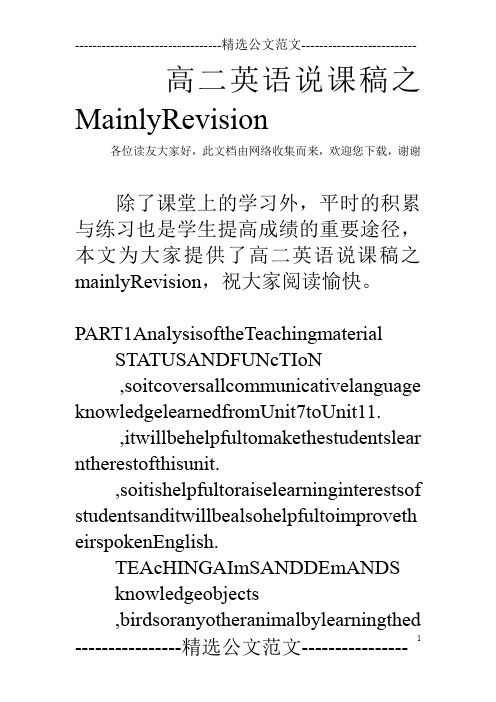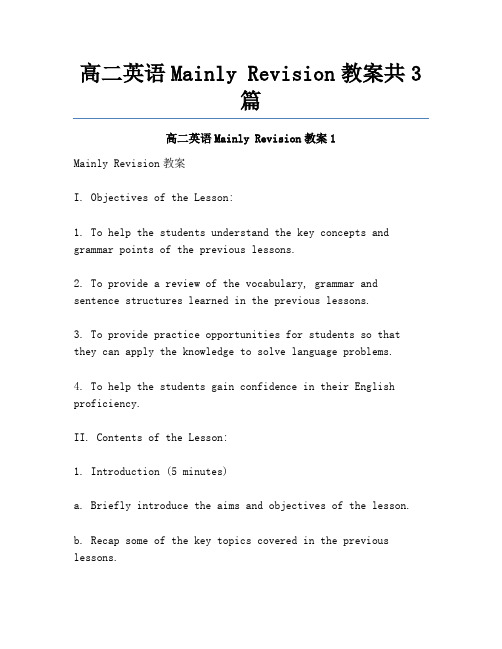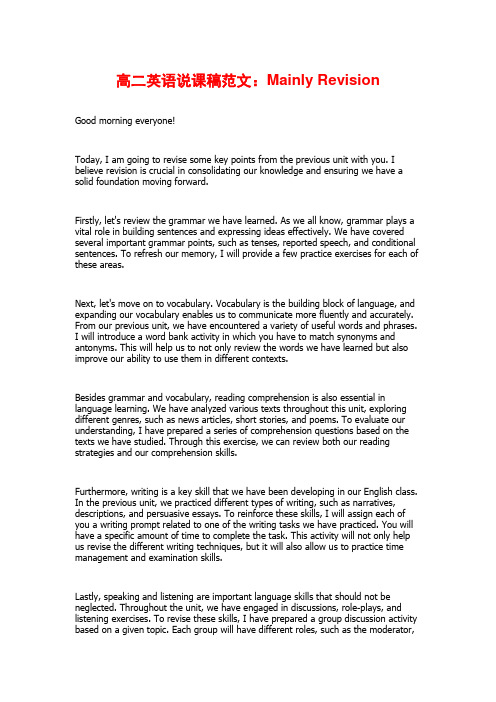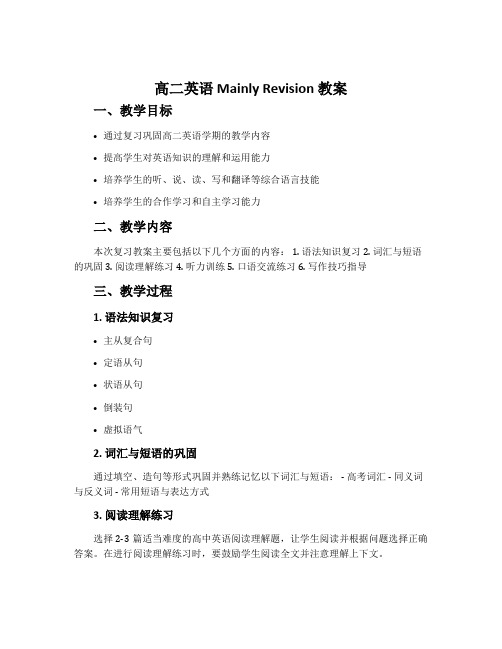高二英语第二单元MainlyRevision
高二英语第二单元MainlyRevision

高二英语第二单元MainlyRevision科目英语年级高二文件high2 unit2.1.doc标题 Mainly Revision章节第二单元关键词内容中国目前约有4亿六千万的烟民,这是一个多么触目惊心的数字呀!吸烟有害健康,是一个十分肯定的结论。
教师在教学过程中要积极渗透这一观点,方法要巧秒,使学生都能接受这一观点,并真正做到不吸【抛砖引玉】教师在授课前可设置如下的问题,并让学生畅所欲言:1. 你经常聆听你心跳的声音,感受脉搏的跳动吗?2. 你是否曾有过因生命的存在而激动不已的瞬间?3. 有什么理由可以让你放弃对生命的拥有?在引起学生的共鸣之后,可进一步加以启发:科学早已证明,吸一只香烟至少使人少活5分钟,你是否真的甘愿让无比珍贵的、有限的生命在喷云吐雾中烟消灰散?通过这样的导课,既可以吸引学生对本单元学习的兴趣,又能让他们接受一次正面的教诲,一举两得,从而实现教学目的。
本单元能力目标:① 对话(Lesson 5)a. 朗读:语音语调准确,情感适度;b. 归纳:归纳出用英语进行请求、给予和拒绝的方法;Asking permission Giving permission Refusing permission Do you mind if I DO … ?Would you mind if I DID … ?May / Can / Could I DO… ? No. Go ahead.Certainly / Of course not.Sure . / Of course. I'm sorry , it is not allowed.I'm afraid , you'd better not.c. 运用:套用句型模拟对话;d. 创造:自编对话并表演;e. 写作:复述并将对话改写成短文。
② 课文(Lesson 6、7)a. 理解课文大意,能回答有关问题。
(Wb. P79 Excise 1; P80 Excise 1 )b. 归纳大意,能复述课文。
高二英语MainlyRevision教案:阅读技巧提升攻略

高二英语MainlyRevision教案:阅读技巧提升攻略As a high school student, it is important to master reading skills that can help you comprehend different texts and unearth critical information. The Mainly Revision teaching program focuses on helping students improve their reading skills, which are crucial for academic success. In this article, we will delve into the techniques that are taught during this program to help students become better readers.The Mainly Revision program uses several strategies to help students improve their reading comprehension. The following are some of the techniques taught during the program:1. Previewing the materialBefore delving into the text, it is important to preview the material to gain an overview of what to expect. This technique helps readers to set expectations and better equip them to dive into the text. It can also help readers to identify key terms or concepts that will be emphasized in the text.2. Skimming and scanningSkimming and scanning are effective techniques for handling vast amounts of reading material. Skimming involves quickly reviewing a text by reading headings, subheadings, and first sentences to get a general understanding of the text. Scanning, on the other hand, involves looking for specific information by focusing on keywords or phrases.3. Active readingActive reading involves engaging with the text by highlighting key concepts, taking notes, and summarizing sections. This technique helps readers to better understand the text and retain crucial information for future reference.4. Reading StrategiesUsing reading strategies can help students gain new insights and interpretations of texts. These techniques include making connections, visualizing, questioning, and predicting. Making connections helps readers to relate to the text, while visualizing can help them to create a mentalimage of what is happening in the text. Questioning and predicting help readers to think critically and engage with the text actively.5. Re-readingRe-reading is important, as it helps readers to improve their comprehension of the text. When re-reading, it is crucial to pay attention to the details and reinforce the ideas and key concepts discussed in the text.6. ContextUnderstanding the context in which a text is written can help readers to grasp the intended meaning and purpose of the author. It can also help readers to identify the message that the author is trying to communicate.In conclusion, the Mainly Revision program is aneffective way to improve reading skills and comprehension. It teaches students to preview materials, skim and scan, read actively, use reading strategies, re-read text, and consider context. By practicing these techniques, students can becomebetter readers, gaining insights and understanding from texts and literature.。
Mainly revision高中英语教案

连用。
西方国家在星期一至星期五时,正餐一般是晚餐;在周末时,一般是午餐。
dinner还可指“宴会”,通常作可数名词,如:They were at dinner when I called.当我去探望时,他们正在吃饭。
The city government will give a dinner to welcome the foreigners.市政府将设宴款待这些外宾,以示欢送。
meal意为“一顿〔餐〕饭”,可指一天早、中、晚中的任何一餐,是可数名词,如:
What time do you usually have your meals? 你通常什么时候吃三餐?
5.offer和supply的区分
从意义上来讲:
offer多表示主动提出给对方某物或主动提出做某事
supply 那么多表示供应对方生活必需品
从搭配上来讲:
offer后可接:名词或代词;干脆宾语和间接宾语;to do。
supply多用于以下构造:supply sth. to /for sb. ; supply sb. with sth.。
但当offer表示“供应出售”之意时,它可与supply替换运用。
例如:
He offered me a cup of coffee. 他给我端来一杯咖啡。
He offered to help me.他表示情愿协助我。
高二英语说课稿之MainlyRevision

高二英语说课稿之MainlyRevision各位读友大家好,此文档由网络收集而来,欢迎您下载,谢谢除了课堂上的学习外,平时的积累与练习也是学生提高成绩的重要途径,本文为大家提供了高二英语说课稿之mainlyRevision,祝大家阅读愉快。
PART1AnalysisoftheTeachingmaterial STATUSANDFUNcTIoN,soitcoversallcommunicativelanguage knowledgelearnedfromUnit7toUnit11.,itwillbehelpfultomakethestudentslear ntherestofthisunit.,soitishelpfultoraiselearninginterestsof studentsanditwillbealsohelpfultoimproveth eirspokenEnglish.TEAcHINGAImSANDDEmANDSknowledgeobjects,birdsoranyotheranimalbylearningthedialogueofthislesson.pressionsformakingsuggestions.Abilityobjects’listeningandspeakingabilitybyreadingandpr actisingthedialogue.’communicativeabilitybylearningtheusefule xpressionsformakingsuggestionsandreplyi ng.moralobjects,protectthenatureandenvironment.TEAcHINGkEyPoINTS:ndailylife. replyingintheirowndialoguesrelatedtotheda ilylife.TEAcHINGDIFFIcULTIES:,especiallyusageformakingsuggestion s.plying.TEAcHINGAIDS:multi-mediacomputer;oHP;taperecorder;so ftware:PowerpointorAuthorwarePART2Teachingmethods1>FiveStepsApproach.2>communicativeApproach.PART3Studyingwaysrs.PART4TeachingProcedureStep1RevisionGetthestudentstogivesomeanimals’namestheyknowbyaskingthestudentsthefoll owingquestion:canyougiveussomenamesof differentanimalsyouknow?’attentiontothetopicaboutanimals.Step2Lead-in,suchasdogs,softhestudentstospeakEn glishinclassonthetopicstheylikeandfamiliar with.??whatisitorwhatarethey???…Step3DialoguePresentationAftertheteacher’,askthestudentsbility.Questions:??Thi,,dealwithsomelanguagepointsraisedbyt hestudentsorappearinginthequestions.Questions:???????Languagepoints:=afewdaysagobTheydon’tgetenoughair:withabowl,c30cmby30cmby50cm.wedescri,andthewidthandheightboth30cm.eunderwaterplants:Theseplantsoxygenatethewaterandkeepitcl ean.dForonething=onereasonencespatternformakingsuggestionsandrepl yingonthebaseofreadingthedialoguefluentl y.suggestionsandreplyinginthisdialogue,inth emeanwhileshowtressions.Infact,,usingamulti-mediacomputer,thenas kthestudentstomakeshortdialogueswiththei rpartnerstopractisemakingsuggestionsandr eplying,eseexpressions. Thisstepgivesthestudents5-8minutestomakeasimilardialogueusingthephrasesandsente ncespatternslearnedinth,,inthemeanwhilede alw’communicationintheclass;andtogivethestud entsachanc,theywillbenefitalotintheirspoke nEnglish.Situation: oneofyourclassmateswantstokeepbirds,he//’dliketoadvisehim/herwhattodo? FinishExx1and3orally,leftEx2aswrittenwor k.,thestudentsarerequiredtopayattentiont othechangeoftheverbtenses,Step8Homework!.s.PART5BlackboardDesignUnit12Lesson45=afewdaysagothelength50cmthewidth30cmtheheight30cm.=onereason…makingsuggestions:Isuggestyoushould...yououghtto...youneedto...you’dbetter...本文就是中国()为大家整理的高二英语说课稿之mainlyRevision,希望能为大家的学习带来帮助,不断进步,取得优异的成绩。
高二英语Mainly Revision教案共3篇

高二英语Mainly Revision教案共3篇高二英语Mainly Revision教案1Mainly Revision教案I. Objectives of the Lesson:1. To help the students understand the key concepts and grammar points of the previous lessons.2. To provide a review of the vocabulary, grammar and sentence structures learned in the previous lessons.3. To provide practice opportunities for students so that they can apply the knowledge to solve language problems.4. To help the students gain confidence in their English proficiency.II. Contents of the Lesson:1. Introduction (5 minutes)a. Briefly introduce the aims and objectives of the lesson.b. Recap some of the key topics covered in the previous lessons.c. Explain how the lesson will help the students developtheir language skills.2. Vocabulary Review (20 minutes)a. Review the key vocabulary from the previous lessons.b. Use different vocabulary exercises and activities, such as matching, fill in the blanks, word association, etc.c. Help the students understand how to use the words in different contexts and settings.3. Grammar Review (20 minutes)a. Review the key grammar points and sentence structures covered in the previous lessons.b. Use different grammar exercises and activities, such as gap-filling, sentence correction, verb tenses, etc.c. Help the students understand how to use the grammar points and sentence structures in different contexts and settings.4. Reading and Writing Practice (20 minutes)a. Provide a reading passage for the students to read.b. Ask them to answer comprehension questions related to the reading passage.c. Ask the students to write a summary of the passage.5. Speaking and Listening Practice (20 minutes)a. Provide a topic for discussion.b. Divide the students into groups and ask them to discussthe topic.c. Monitor the discussion and provide feedback on how wellthe students are participating.6. Conclusion (5 minutes)a. Recap the key points covered in the lesson.b. Provide the students with feedback on how well they have done.c. Encourage them to continue learning and practicing their English.III. Materials Needed:1. Textbooks and other materials related to the previous lessons.2. Worksheets and exercises related to grammar and vocabulary.3. Reading passage and comprehension questions.4. Topic for discussion.5. Writing materials.IV. Teaching Methodologies:1. Lecture/Discussion.2. Cooperative Learning.3. Reading and Writing activities.4. Listening and Speaking activities.5. Feedback and Reflection.V. Assessment:1. Short quizzes on vocabulary and grammar.2. Writing assignments.3. Oral presentations.4. Participation in class discussions.5. Group activities and projects.VI. Conclusion:The Mainly Revision lesson plan is designed to help thestudents recap the key concepts and grammar points covered in the previous lessons. Through various activities, studentsgain opportunities to apply knowledge and language problems. The main goal is to develop students' confidence with English proficiency. Various techniques are used in the lesson tocater to the different learning styles and abilities of the students. Continuous assessment provides feedback to students, reinforcing their learning and improving their English proficiency.高二英语Mainly Revision教案2Title: Mainly RevisionGrade level: High School, Grade 11Duration: 2 class periods (90 minutes each)Objectives:- To review and reinforce previous learning in various language skills- To identify and correct common errors in different language areas- To prepare students for upcoming assessmentsMaterials:- Whiteboard and markers- Worksheets on grammar, vocabulary, reading, and writing- Sample test questions and answer keysProcedure:Day 1Introduction (10 minutes)- Greet the students and explain the purpose of the lesson. - Review the topics or units covered in the previous term, and remind them of the upcoming assessments.Grammar Review (20 minutes)- Distribute the grammar worksheets, which cover common errors in verb tense, subject-verb agreement, pronoun reference, and adjective usage.- Instruct the students to work individually or in pairs to complete the exercises.- Monitor their work and provide feedback as needed.- Collect the worksheets and go over the correct answers with the class.Vocabulary Review (20 minutes)- Hand out the vocabulary worksheets, which feature synonyms, antonyms, homophones, and idiomatic expressions.- Ask the students to use context clues, word roots, and word forms to guess the meanings of the unfamiliar words.- Encourage them to use the new words in sentences to demonstrate their understanding.- Collect the worksheets and check their answers together.Reading Review (30 minutes)- Provide the students with a reading passage, either from a textbook, a novel, or a news article.- Instruct them to read the passage carefully and answer the comprehension questions that follow.- Remind them to look for specific details, main ideas, themes, and literary devices.- After they finish, have a class discussion to review their answers and share their insights.Writing Review (30 minutes)- Give the students a writing prompt, such as a personal narrative, an argumentative essay, or a critical review.- Ask them to plan and organize their ideas, structure their paragraphs, and use appropriate transitions and linking words. - Provide feedback on their brainstorming and outlining, and encourage them to revise and edit their drafts.- Collect the essays and give them feedback the next day.Conclusion (10 minutes)- Summarize the main points of the lesson, and highlight the areas that need further practice.- Assign homework, such as reviewing the grammar rules, memorizing the new vocabulary, or reading a book for pleasure.Day 2Warm-up (10 minutes)- Review the homework from the previous day, and answer any questions they may have.- Give them a quick quiz on the vocabulary and grammar rules.Listening Review (20 minutes)- Play an audio recording, such as a speech, a podcast, or a news report.- Ask the students to take notes on the main points, thespeaker's tone and emphasis, and any unfamiliar words or phrases.- After the recording ends, lead a class discussion on the topic, and encourage the students to share their opinions and ask questions.Speaking Review (30 minutes)- Divide the class into small groups or pairs, and give them a discussion topic or a role-play scenario.- Ask them to use the target grammar and vocabulary, and to express their ideas clearly and persuasively.- Provide feedback on their pronunciation, intonation, and fluency, and give them tips on how to improve.Test-taking Strategies (20 minutes)- Show the students the sample test questions, which cover different types of exams, such as multiple-choice, short answer, essay, and oral presentation.- Discuss the strategies for tackling each type of question, and highlight the do's and don'ts of test-taking.- Give them advice on how to manage their time, stay focused, and avoid common mistakes.Conclusion (10 minutes)- Review the key concepts and skills covered in the lesson, and ask the students to reflect on their learning.- Encourage them to ask questions and seek further assistance if needed.- Remind them to prepare thoroughly for their upcoming assessments, but to also take care of their physical and mental well-being.高二英语Mainly Revision教案3高二英语 Mainly Revision 教案教学目标:1. 温习已学知识点,巩固语言基础;2. 提高学生英语听、说、读、写、译等综合能力;3. 培养学生学习英语的兴趣及自主学习能力。
高二英语说课稿范文:Mainly Revision

高二英语说课稿范文:Mainly RevisionGood morning everyone!Today, I am going to revise some key points from the previous unit with you. I believe revision is crucial in consolidating our knowledge and ensuring we have a solid foundation moving forward.Firstly, let's review the grammar we have learned. As we all know, grammar plays a vital role in building sentences and expressing ideas effectively. We have covered several important grammar points, such as tenses, reported speech, and conditional sentences. To refresh our memory, I will provide a few practice exercises for each of these areas.Next, let's move on to vocabulary. Vocabulary is the building block of language, and expanding our vocabulary enables us to communicate more fluently and accurately. From our previous unit, we have encountered a variety of useful words and phrases.I will introduce a word bank activity in which you have to match synonyms and antonyms. This will help us to not only review the words we have learned but also improve our ability to use them in different contexts.Besides grammar and vocabulary, reading comprehension is also essential in language learning. We have analyzed various texts throughout this unit, exploring different genres, such as news articles, short stories, and poems. To evaluate our understanding, I have prepared a series of comprehension questions based on the texts we have studied. Through this exercise, we can review both our reading strategies and our comprehension skills.Furthermore, writing is a key skill that we have been developing in our English class. In the previous unit, we practiced different types of writing, such as narratives, descriptions, and persuasive essays. To reinforce these skills, I will assign each of you a writing prompt related to one of the writing tasks we have practiced. You will have a specific amount of time to complete the task. This activity will not only help us revise the different writing techniques, but it will also allow us to practice time management and examination skills.Lastly, speaking and listening are important language skills that should not be neglected. Throughout the unit, we have engaged in discussions, role-plays, and listening exercises. To revise these skills, I have prepared a group discussion activity based on a given topic. Each group will have different roles, such as the moderator,the speaker, and the listener. This will allow us to practice active listening, effective speaking, and cooperation with our peers.In conclusion, revision is essential for solidifying our knowledge and ensuring that we have a strong base moving forward. By revisiting grammar, vocabulary, reading comprehension, writing, speaking, and listening, we can review and reinforce the important aspects of the previous unit. I hope that through these revision exercises, we can confidently move on to the next unit and continue to expand our English language skills. Thank you for your attention and let's begin our revision!。
高二英语MainlyRevision教案_2(标准版)

高二英语MainlyRevision教案XX高一英语学案:m3u2reading words(牛津译林版必修3)learning content: learn words and expressions about reading in m3u2learning aims: 1.learn words and expressions.2.increase their vocabulary by learning rules of word formations.learning difficulties and important points: grasp the related usages about words.period one:self-study1. be made up of 由……组成,可与consist of 互换the class is made up of 15 girl students and 20 boy students. = the class consists of 15 girl students and 20 boy students. 【拓展】: be made of / be made from / be made out of 由……制成be made into 被制成 make up 组成,编制,弥补,化妆,和解make for 走向……;有助于…… make out 理解,辨认出2.occupy vt. 1. 占领; 占有,侵占,占据2. 使从事; 使忙于the enemy soon occupied the town.in doing sthoccupy sb./oneself 使某人/自己忙于做某事with sthin doing sthbe occupied 忙于(做)某事with sthshe occupied herself with routine office tasks.i have been occupied in reading books.【拓展】under occupation 在占领之下,在占领中lose one’s occupation失业fixed/regular occupation固定职业 by occupation职业上【单词累积】occupation占用,职业 occupied没空闲的,忙碌的3.aside from 1. 除…之外还有2. 既…又…in addition apart fromwhat ‘s more besidesmoreover 而且,加之,另外 in addition to 除…之外further more as well as12.process名词 n. [c]1. 过程,进程i will tell you, sooner or later, all the complicated process. 我早晚要将整个复杂过程告诉你。
高二英语Mainly Revision教案

高二英语 Mainly Revision 教案一、教学目标•通过复习巩固高二英语学期的教学内容•提高学生对英语知识的理解和运用能力•培养学生的听、说、读、写和翻译等综合语言技能•培养学生的合作学习和自主学习能力二、教学内容本次复习教案主要包括以下几个方面的内容: 1. 语法知识复习 2. 词汇与短语的巩固 3. 阅读理解练习 4. 听力训练 5. 口语交流练习 6. 写作技巧指导三、教学过程1. 语法知识复习•主从复合句•定语从句•状语从句•倒装句•虚拟语气2. 词汇与短语的巩固通过填空、造句等形式巩固并熟练记忆以下词汇与短语: - 高考词汇 - 同义词与反义词 - 常用短语与表达方式3. 阅读理解练习选择2-3篇适当难度的高中英语阅读理解题,让学生阅读并根据问题选择正确答案。
在进行阅读理解练习时,要鼓励学生阅读全文并注意理解上下文。
4. 听力训练选择1-2段适当难度的听力材料,让学生听录音并回答问题。
听力训练主要针对学生的听力理解能力和听力应试技巧进行训练。
5. 口语交流练习分组进行情景对话练习,学生根据给出的情景和角色扮演对话。
鼓励学生使用所学的语法知识和词汇短语进行口语表达,重点培养学生的口语交流能力和语言运用能力。
6. 写作技巧指导引导学生复习常用写作句型和表达方式,结合高考写作题目,给学生提供写作素材,指导学生如何组织文章结构、运用语法和词汇丰富文章内容。
四、教学评估方法1.课堂练习:在课上进行一些小测验,检测学生对语法知识、词汇短语和阅读理解等方面的掌握情况。
2.个人作业:布置一定量的作业,要求学生在规定时间内完成,然后进行批改和评分。
3.小组讨论和口语交流:在口语交流练习中观察、评估学生的口语表达能力和语法运用能力。
五、教学反思本次主要复习教案侧重于巩固和提高学生对高二英语学期教学内容的理解和运用能力。
通过多种形式的练习和训练,可以帮助学生在复习阶段更好地掌握英语知识,为高二英语学习的顺利进行打下坚实的基础。
- 1、下载文档前请自行甄别文档内容的完整性,平台不提供额外的编辑、内容补充、找答案等附加服务。
- 2、"仅部分预览"的文档,不可在线预览部分如存在完整性等问题,可反馈申请退款(可完整预览的文档不适用该条件!)。
- 3、如文档侵犯您的权益,请联系客服反馈,我们会尽快为您处理(人工客服工作时间:9:00-18:30)。
高二英语第二单元MainlyRevision科目英语年级高二文件high2 unit2.doc标题 Mainly Revision章节第二单元关键词内容一、【教学目的和要求】:1. 单词和词组:go ahead L.5 四会smoker burn down packet remain L.6public give upbe used to hardly L.7club L.8non-smoking cigarette typewriter tape-recording L.5 三会tobacco nation habit reduce compare L.6compared to thereforedislike smelly share non-smoker get into the habit of L.7 comparewwith L.8Hank permission L.5 二会tmale ban L.6drug cancer nicotine L.72. 日常交际用语Do you mind if I do…? I’m sorry, but it’s not allowed. Would you mind if I did…? No. Go ahead.I wonder if I could use your phone. Sure. Go ahead. May/Can/Could I do…?3. 复习名词性从名作宾语和表语的用法。
二、【重点与难点】:L.51. Do you mind if I smoke? 我抽烟你介意吗?Would you mind if I smoked in the office next door? 我到隔壁办公室抽烟你介意吗?在这二个句子中,mind作“介意”,“反对”解,这时,以上二个句子可直译为“如果我抽烟,你反对吗?”,“如果我到隔壁办公室抽烟,你反对吗?”Would / Do you mind…? 是提出请求的表达方式,后面一般直接跟动词的~ing形式或跟if从句。
在回答时,如果不反对,也就是表示愿意时,可用Certainly not,(或Certainly),No go ahead. Not at all.I don’t/won’tt。
但是表示反对或不愿意时,显得不太客气,因此一般说I afraid you can’t. I’d rather you didn’t或者用you’d better not.等表示较委婉的语气。
例如:Do you mind if I ask you a few questions? 如果你不介意的话,我问你几个问题可以吗?Certainly not, Go ahead. 当然可以,请问吧。
Would you mind if I sat here? 我坐在这儿你介意吗?I afraid you can’t. 恐怕不能。
另外需要注意的是在Would you mind if I sat here?句中,如果前面用了would ,if从句中通常用一般过去时,但它不表示过去,而是表示说话人的礼貌与委婉的语气。
在Do/would you mind …?这一结构中,除了后面用if从句外,还可以用动词的~ing形式。
这时表示说话人请求对方做某事,动作的执行者仍是主语you,因此也不用if从句。
但是mind后面的动作不是主语you的动作时,用动词~ing时,前面须有人称代词宾格或物主代词,这一人称代词宾格或物主代词便是动词~ing形式的逻辑主语,也就是动词~ing形式的动作执行者。
例如:Would you mind opening the windows? 请您把窗子打开好吗?Would you mind my opening the windows? (or, Would you mind if I opened theWindows?) 我打开窗子您不反对吧?这类问句的回答同前所述。
2.I wonder if I could use your phone. 我能不能用一下你的电话?Sure. Go ahead. 好的,你用吧。
a. I wonder if I could /can…是请求允许的交际用语,表示请求对方允许自己干某事的意思。
句用的wonder是动词,作想“想知道”解,后面可以跟if/wheather 从句。
另外句中的could 比can在语气上更委婉一些。
在回答这一请求时,表示肯定时多用:Sure, go ahead. 好的,请吧。
Yes, please do. / Of course /Sure. 当然可以。
如果作否定回答,则用:I’m afraid not. 恐怕不行吧。
I sorry, but…对不起,…you’d better not. 最好不。
b. 句中的go ahead 直译为“往前走” ,“先走” ,“走在前面” 。
但在这里用于引伸意义,表示鼓励对方做某事,作“请吧” 、“说下去”、“请尽管用”解,常见于日常对话中。
例如:Can I have a look at your new dictionary?Sure, Go ahead.“我可以看一下你的新词典吗”?“可以,看吧”L.61. Every year, millions of smokers die because of illness which are caused bysmoking tobacco.每年有数以百万计的人因吸烟而引起病死亡。
句中的die because of …也可以说die of …,作“因……而死亡”解。
die of常指由于疾病,饥饿,寒冷,年老等而死亡,同时也表示死于忧愁、失恋等情感因素。
例如:The man died of lung cancer.哪个人死于肺癌。
The beggar died of cold and hunger.这个乞丐由于寒冷和饥饿而死亡。
The poor man died of sorrow.可怜的穷人因忧愁而死亡。
另外,指除了疾病或情感以外的原因造成的死亡一般用die from 来表示,课文中出现类似的句子有:This is because each year millions of smokers die from the habit.这是因为每年有数以百万计的烟民因吸烟而死亡。
The chance is that one smoker in four will die from smoking.每四个烟民中就有一人可能因吸烟而死亡。
The problem is that 300 people are dying each day from illness caused by smoking.问题在于每天都有300人死于因吸烟而引起的疾病。
但有时die from也可以用来指由于疾病的原因而造成的死亡。
例如:He died of /from lung cancer. 他死于肺癌。
2.Finst, money is spent looking after people with illnesses which have been caused by smoking.第一,政府要花钱来照顾因吸烟而患病的人.a. 表示“花钱/时间干某事”可能性用句型“sb spends time/money doing sth”。
在此句中,用的是这一句型的被动语态结构。
例如:Every morning he spends half an hour reading English.他每天早晨用半小时读英语。
He spent a lot of money mending his old car.他花了很多钱修他那辆旧车。
b. 句中的cause为动词,表示“导致”、“引起”,作及物动词,有时可接直接宾语和间接宾语。
例如:Somoking can cause lung cancer.吸烟可致肺癌。
He caused his parents much unhappiness.他惹得他父母很不愉快。
She’s always causing trouble for people.她总是给人添麻烦。
cause也可以作为名词,作“原因”、“理由”、“事业”解。
例如:What was the cause of the accident?这场事故的原因是什么?She is never absent from work without good cause .她决不无故缺勤。
His life was devoted to the cause of justice .他为正义事业而献身。
3. The bedclothes catch fire and the whole house may be burnt down.铺盖着火了,整个房子都可能烧掉。
a. catch fire作“着火”、“起火”解,有动态的含义,(尤指意外地烧着,着火。
)The house caught fire while we were away. 当我们外出时,房子着火了。
The girl was standing too close to the fire and her dress caught fire. 那小姑娘站得离火太近了,衣服烧着了。
除此之外,还有短语be on fire, set …on fire表示“烧着”、“着火”的意思,但be onfire有静态的含义,而set …on fire是“使……着火”、“放火烧……”的意思。
例如: Look, the house is on fire. 瞧,房子着火了!The police caught the man who set the house on fire.警察抓住了放火烧那房子的人。
b. 动词短语burn down 作“烧毁”、“烧掉”解,主语一般是表示事物的名词。
例如:The house burnt down in half an hour. 那所房子在半小时之内就被焚为平地。
D on’t leave the gas on, or you might burn the house down. 别忘了关煤气,不然会把房子烧掉的。
4. China produces one third of the world’s agarettes. 中国生产的香烟占全世界香烟的三分之一。
请注意英语中分数表达法:除二分之一()和四分之一()分别由a(one)half和a(one) quarter表示外,分数的构成通常是分子用基数词,分母用序数词。
如果分子大于1,则分母用序数词的复数形式,如:(two thirds), (three quarters),(one half) (two sixths), (four fifths)5 .Every year, tobacco companies must persuade new people to start smoking agatettes.每年烟草公司要设法使一些不吸烟的人开始吸烟。
